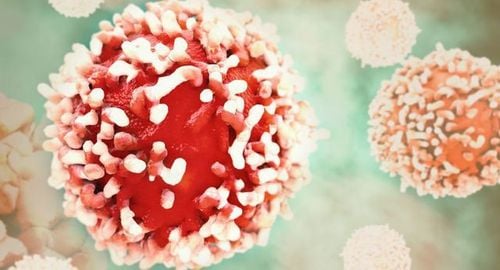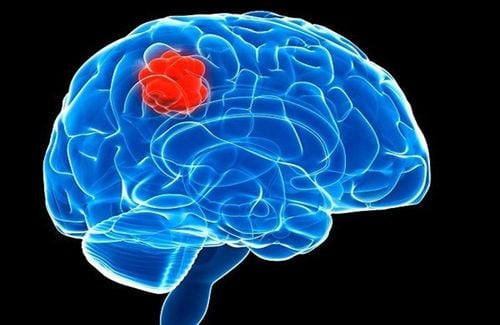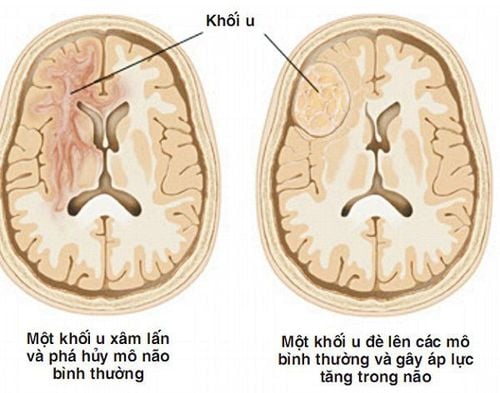This is an automatically translated article.
While primary brain tumors form in the brain itself or in tissues near the brain, secondary brain tumors arise when normal cells experience errors (mutations) in their DNA. Currently, treatment options depend on the type of brain tumor a person has, as well as its size and location.
1. Learn about primary and secondary brain tumors
Brain tumor is the growth of abnormal cells in the brain, some tumors are benign (non-cancerous), others are malignant. Brain tumors are classified into 2 types, including:
Primary brain tumors: Tumors that start in the brain; Secondary brain tumor: A brain cancer that starts in other parts of the body and spreads to the brain. The growth rate and location of brain tumors can be very different from person to person, which is a determining factor in the effects of nervous system function on the patient's body. Brain tumor treatment options depend on the type of brain tumor you have, as well as its size and location.
2. Symptoms of brain tumor
Symptoms of brain tumors vary from person to person, depending on factors such as: The size, location and growth rate of the brain tumor.
Typical symptoms include:
New onset or change in headache pattern; The headache gradually becomes more frequent and severe; Unexplained nausea or vomiting; Have vision problems, such as blurred vision, double vision ( diplopia ) or loss of peripheral vision; Gradual loss of sensation or difficulty moving an arm or leg; Difficulty keeping balance; Hard to say; Confusion in everyday affairs; Changes in personality or behavior; Seizures, especially in patients with no history of seizures; Hearing problems.

Các khối u não nguyên phát xảy ra khi các tế bào bình thường gặp lỗi (đột biến) trong DNA của chúng
3. Causes of primary brain tumor and secondary brain tumor
3.1 Primary brain tumors Primary brain tumors form in the brain itself or in tissues near the brain such as: The membranes that cover the brain (meninges), cranial nerves, pituitary gland, or pineal gland.
Primary brain tumors arise when normal cells experience errors (mutations) in their DNA. These mutations allow cells to grow and divide at a rapid rate and continue to live while healthy cells die. The result is the formation of a mass of abnormal cells, forming a tumor.
In adults, primary brain tumors are less common than secondary brain tumors. There are different types of primary brain tumors, such as:
Glioma: These tumors start in the brain or spinal cord, including astrocytomas, thymomas, and astrocytomas. , glioblastoma, small cell tumor, oligodendroglioma... Meningioma: A tumor that arises from the membranes surrounding the brain and spinal cord (meninges) ). Most meningiomas are benign, not cancerous. Schwannoma: These are benign tumors that grow on the nerves that control balance and hearing that lead from our inner ear to our brain. Pituitary tumors: Most pituitary adenomas are benign tumors that develop in the pituitary gland at the base of the brain. These tumors can affect pituitary hormones that act throughout the body. Myeloblastoma: The most common brain cancer in children. Myeloblastoma begins in the back of the brain and tends to spread through the spinal fluid. These tumors are less common in adults, but they can still occur. Germ cell tumors: These germ cell tumors can develop during childhood in the testicles or ovaries. But sometimes these germ cell tumors affect other parts of the body, such as the brain. Craniopharyngioma: These are rare noncancerous tumors that start near the pituitary gland of the brain, which secretes hormones that control many body functions. When craniopharyngioma grows slowly, it can affect the pituitary gland and other structures near the brain. 3.2 Secondary brain tumors Secondary (metastatic) brain tumors are tumors caused by cancer that start elsewhere in the body and then spread to the brain. Secondary brain tumors are most common in patients with a history of cancer. In rare cases, a metastatic brain tumor can be the first sign that cancer has started elsewhere in the body.
In adults, secondary brain tumors are much more common than primary brain tumors. Any cancer can spread to the brain, especially:
Breast cancer ; Colon cancer ; Kidney cancer ; Lung cancer ; Melanoma cancer. 3.3 Risk factors Most people with primary brain tumors have no known cause. Through physical examination, doctors identify a number of factors that may increase the risk of the disease, including:
Exposure to radiation: People are exposed to a type of radiation called radiation ionizers have a higher risk of brain tumors. Examples of ionizing radiation include: Radiation therapy used to treat cancer and radiation exposure caused by atomic bombs. Family history of brain tumors: A small percentage of brain tumors occur in people with a family history of brain tumors or genetic syndromes that increase their risk.

Các khối u não thứ phát thường gặp nhất ở những bệnh nhân có tiền sử ung thư
To protect health and improve treatment efficiency when suffering from primary or secondary brain tumors, patients need to go to the hospital to be examined by a specialist as soon as symptoms appear. In addition, early cancer screening is also considered a perfect measure in timely detection and treatment of cancers. Reduce the cost of treatment and especially reduce the mortality rate in patients. Vinmec International General Hospital always deploys and introduces to customers the Early Cancer Screening Package at Vinmec - Peace of mind to live well to help with gene testing, imaging, testing of biomarkers to detect tumors you early.
Choosing the Early Cancer Screening Package at Vinmec - Peace of mind at Vinmec, customers will get:
Only one gene test can assess the risk of 16 common cancers in both men and women ( Lung cancer, brain tumor, colorectal cancer, breast cancer, pancreatic cancer, cervical cancer, stomach cancer, prostate cancer,.....) Early detection of signs etiology of cancer through imaging, endoscopy and ultrasonography. The operation is simple, careful and accurate. A team of well-trained specialists, especially in oncology, are capable of handling cancer cases. With a system of facilities, advanced and modern medical equipment and a team of doctors with deep expertise and experience, it will help the examination and treatment process of patients at Vinmec become faster with High efficiency, save cost and time.
Reference source: Mayoclinic.org













